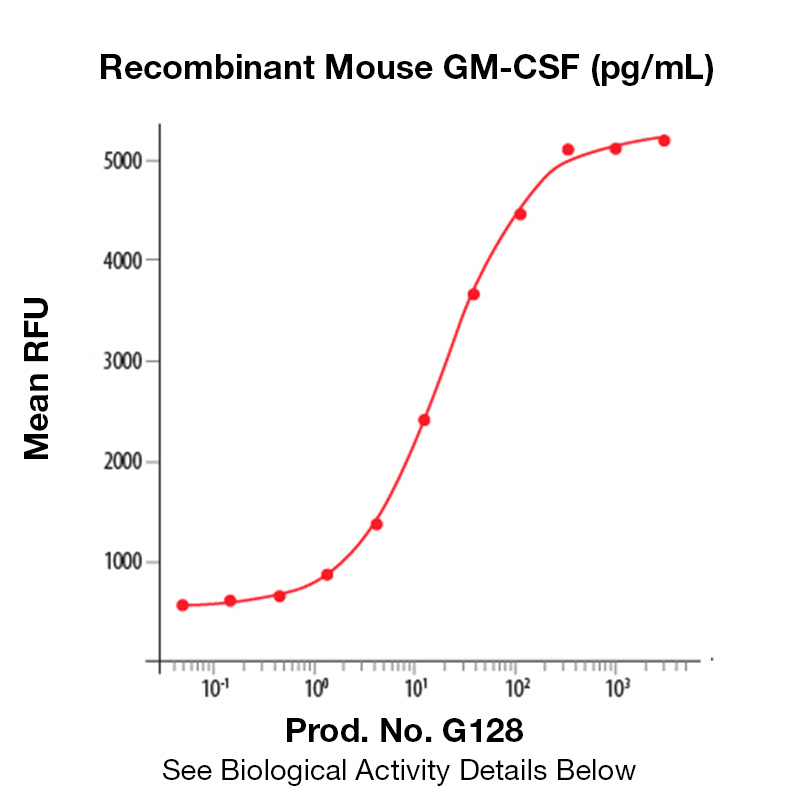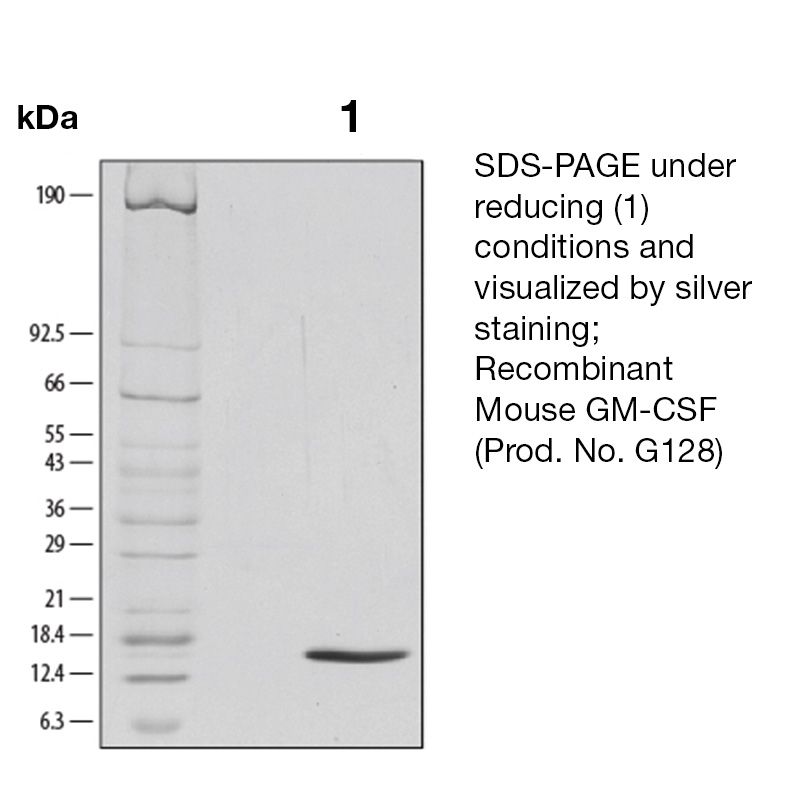Recombinant Mouse GM-CSF
Data
- -
- -
BackgroundGranulocyte-Macrophage Colony Stimulating Factor is a 22 kD, pleiotropic cytokine that is a white blood cell growth factor. It controls the production and function of blood cells by stimulating stem cells to produce granulocytes and monocytes. GM-CSF differs from G-CSF in that it affects more cell types including macrophages and eosinophils. Moreover, GM-CSF is part of the immune/inflammatory cascade, a process crucial for fighting infection. Interestingly, GM-CSF expression may have pathological implications. Autocrine expression of GM-CSF in myeloid leukemia cells is suspected to play a role in neoplasia, the formation of a new and abnormal growth of tissue. Additionally, GM-CSF expression has also been documented in certain solid tumors. There have also been reports of GM-CSF in synovial fluid from patients with arthritis suggesting that GM-CSF may play a role in tissue damage associated with the inflammatory process. Blocking GM-CSF is thought to have therapeutic potential by reducing inflammation. Some drugs are currently being developed to block GM-CSF. Protein DetailsPurity >97% by SDS-PAGE and analyzed by silver stain. Endotoxin Level <1.0 EU/µg as determined by the LAL method Biological Activity The biological activity of Mouse GM-CSF was determined by proliferation of the factor-dependent murine cell line, DA-3 (Ihle, J.N. et al., 1984, Advances in Viral Oncology, G. Klein, ed. Raven Press, New York, NY. 4:95 - 137). The expected ED<sub>50</sub> is 10 - 60 pg/ml. Protein Accession No. Amino Acid Sequence ptrspitvtr pwkhveaike alnllddmpv tlneevevvs nefsfkkltc vqtrlkifeq glrgnftklk galnmtasyy qtycpptpet dcetqvttya dfidslktfl tdipfeckkp vqk N-terminal Sequence Analysis Met State of Matter Lyophilized Predicted Molecular Mass The predicted molecular weight of Recombinant Mouse GM-CSF is Mr 14.3 kDa. However, the actual molecular weight as observed by migration on SDS-PAGE is 14 kDa (reducing conditions). Predicted Molecular Mass 14.3 Formulation This recombinant protein was 0.2 µm filtered and lyophilized from modified Dulbecco’s phosphate buffered saline (1X PBS) pH 7.2 – 7.4 with no calcium, magnesium, or preservatives. Storage and Stability This lyophilized protein is stable for six to twelve months when stored desiccated at -20°C to -70°C. After aseptic reconstitution, this protein may be stored at 2°C to 8°C for one month or at -20°C to -70°C in a manual defrost freezer. Avoid Repeated Freeze Thaw Cycles. See Product Insert for exact lot specific storage instructions. Country of Origin USA Shipping Next Day Ambient NCBI Gene Bank References & Citations1. Parker, MW. et al. (2008) Cell 134: 496 2. Whitsett, JA. et al. (2002) Annual Review of Physiology 64: 775 Certificate of AnalysisIMPORTANT Use lot specific datasheet for all technical information pertaining to this recombinant protein. |
Related Products
- -
- -
Prod No. | Description |
|---|---|
G665 | |
G675 | |
G596 | |
G128 | |
G117 | |
G672 | |
G681 | |
G119 | |
G124 | |
G142 | |
G143 | |
G691 |




